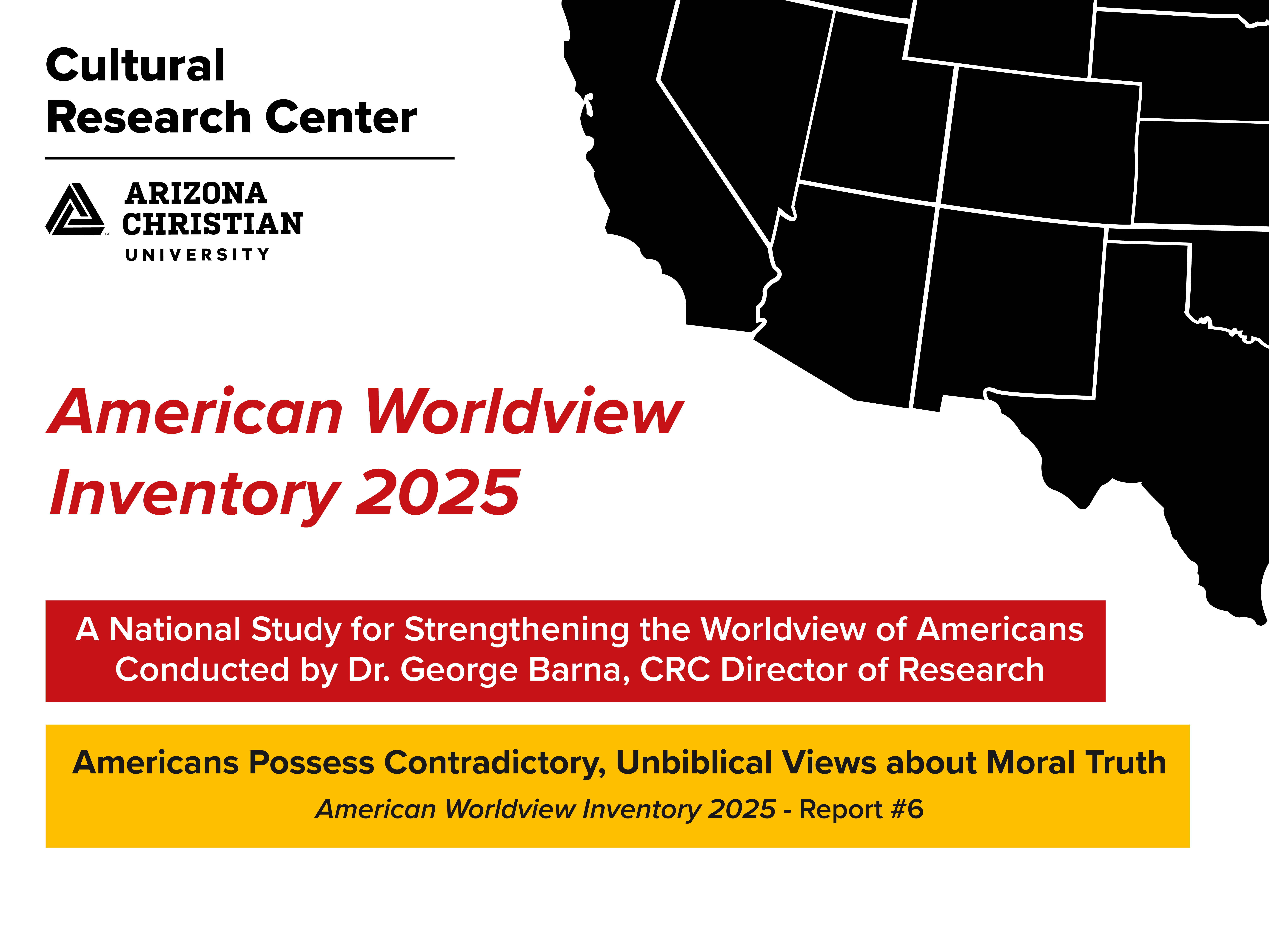Hol
Well-known
From the Cultural Research Center at Arizona Christian University
GLENDALE, AZ (May 15, 2025) — A new national study shows that most Americans no longer believe in absolute moral truth, and instead rely on feelings and cultural norms to make moral decisions.
This shift in belief has resulted in most Americans holding “contradictory and unbiblical views about moral truth,” according to the latest report from the American Worldview Inventory 2025, an annual survey from the Cultural Research Center at Arizona Christian University.
The report from veteran researcher Dr. George Barna found that 74% of adults trust feelings over facts to discern moral truth, two-thirds reject absolute moral truth, and nine out of 10 embrace Syncretism—a blending of competing worldviews.
Even substantial majorities of some of the largest Christian church groups reject absolute morality, signaling a deep cultural shift away from biblical principles. For example, 69% of Catholics and 61% of those who attend a mainline Protestant church reject the idea of absolute moral truth.
Beyond that, the study found that half of theologically-identified born-again Christians—adults considered spiritually conservative and a cornerstone of evangelical Christianity—admit to rejecting absolute moral truth.
According to Barna, CRC Director of Research, the findings raise significant concerns about the long-term implications of this shift in belief for the nation’s moral and spiritual foundations.
“Accepting all truths as equally valid cannot help but dig a deep foundation of chaos, confusion, and helplessness,” Barna explained.
An earlier report from the AWVI 2025 noted that two out of three American adults currently reject or doubt the existence of absolute moral truth. This new report shows that this trend is especially pronounced among younger adults and minority populations, but is also widespread within Christian communities.
Perhaps most concerning, the report highlights that parents of children under age 13 are among the most likely to reject absolute moral truth—a trend that raises red flags about how the next generation will be shaped morally and spiritually.
As Americans increasingly reject moral truth, the leading source for moral guidance is their feelings. A full 74% of adults say they trust their emotional response to determine right from wrong. By comparison, only 44% consult the Bible, and even fewer rely on laws and public policies (41%), scientific or mathematical reasoning (40%), or cultural traditions (39%), the study found.

 www.arizonachristian.edu
www.arizonachristian.edu
GLENDALE, AZ (May 15, 2025) — A new national study shows that most Americans no longer believe in absolute moral truth, and instead rely on feelings and cultural norms to make moral decisions.
This shift in belief has resulted in most Americans holding “contradictory and unbiblical views about moral truth,” according to the latest report from the American Worldview Inventory 2025, an annual survey from the Cultural Research Center at Arizona Christian University.
The report from veteran researcher Dr. George Barna found that 74% of adults trust feelings over facts to discern moral truth, two-thirds reject absolute moral truth, and nine out of 10 embrace Syncretism—a blending of competing worldviews.
Even substantial majorities of some of the largest Christian church groups reject absolute morality, signaling a deep cultural shift away from biblical principles. For example, 69% of Catholics and 61% of those who attend a mainline Protestant church reject the idea of absolute moral truth.
Beyond that, the study found that half of theologically-identified born-again Christians—adults considered spiritually conservative and a cornerstone of evangelical Christianity—admit to rejecting absolute moral truth.
According to Barna, CRC Director of Research, the findings raise significant concerns about the long-term implications of this shift in belief for the nation’s moral and spiritual foundations.
“Accepting all truths as equally valid cannot help but dig a deep foundation of chaos, confusion, and helplessness,” Barna explained.
An earlier report from the AWVI 2025 noted that two out of three American adults currently reject or doubt the existence of absolute moral truth. This new report shows that this trend is especially pronounced among younger adults and minority populations, but is also widespread within Christian communities.
Perhaps most concerning, the report highlights that parents of children under age 13 are among the most likely to reject absolute moral truth—a trend that raises red flags about how the next generation will be shaped morally and spiritually.
As Americans increasingly reject moral truth, the leading source for moral guidance is their feelings. A full 74% of adults say they trust their emotional response to determine right from wrong. By comparison, only 44% consult the Bible, and even fewer rely on laws and public policies (41%), scientific or mathematical reasoning (40%), or cultural traditions (39%), the study found.

Barna/CRC: Americans’ Views of Moral Truth ‘Contradictory, Unbiblical’ - Arizona Christian University
From the Cultural Research Center at Arizona Christian University GLENDALE, AZ (May 15, 2025) — A new national study shows that most Americans no longer believe in absolute moral truth, and instead rely on feelings and cultural norms to make moral decisions. This shift in belief has resulted in...



